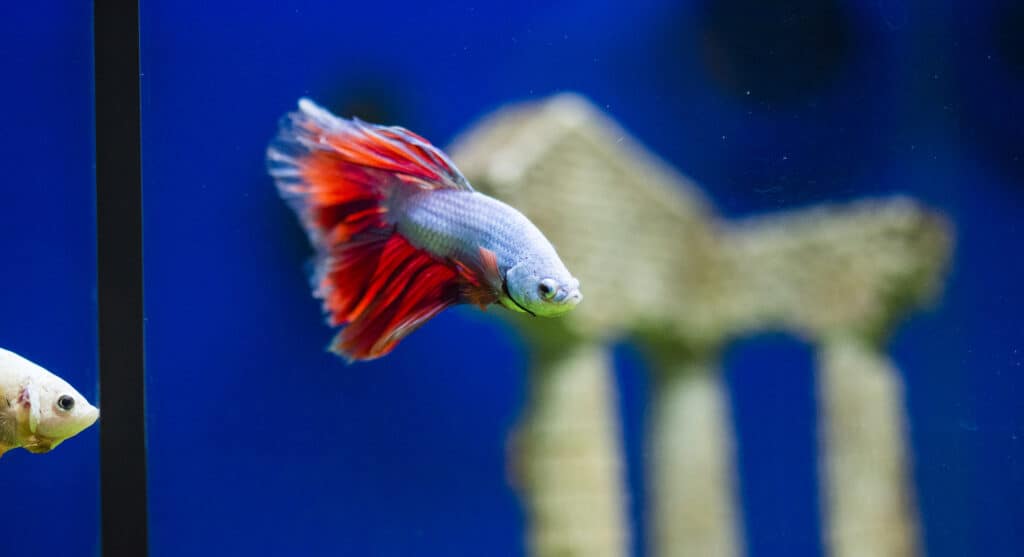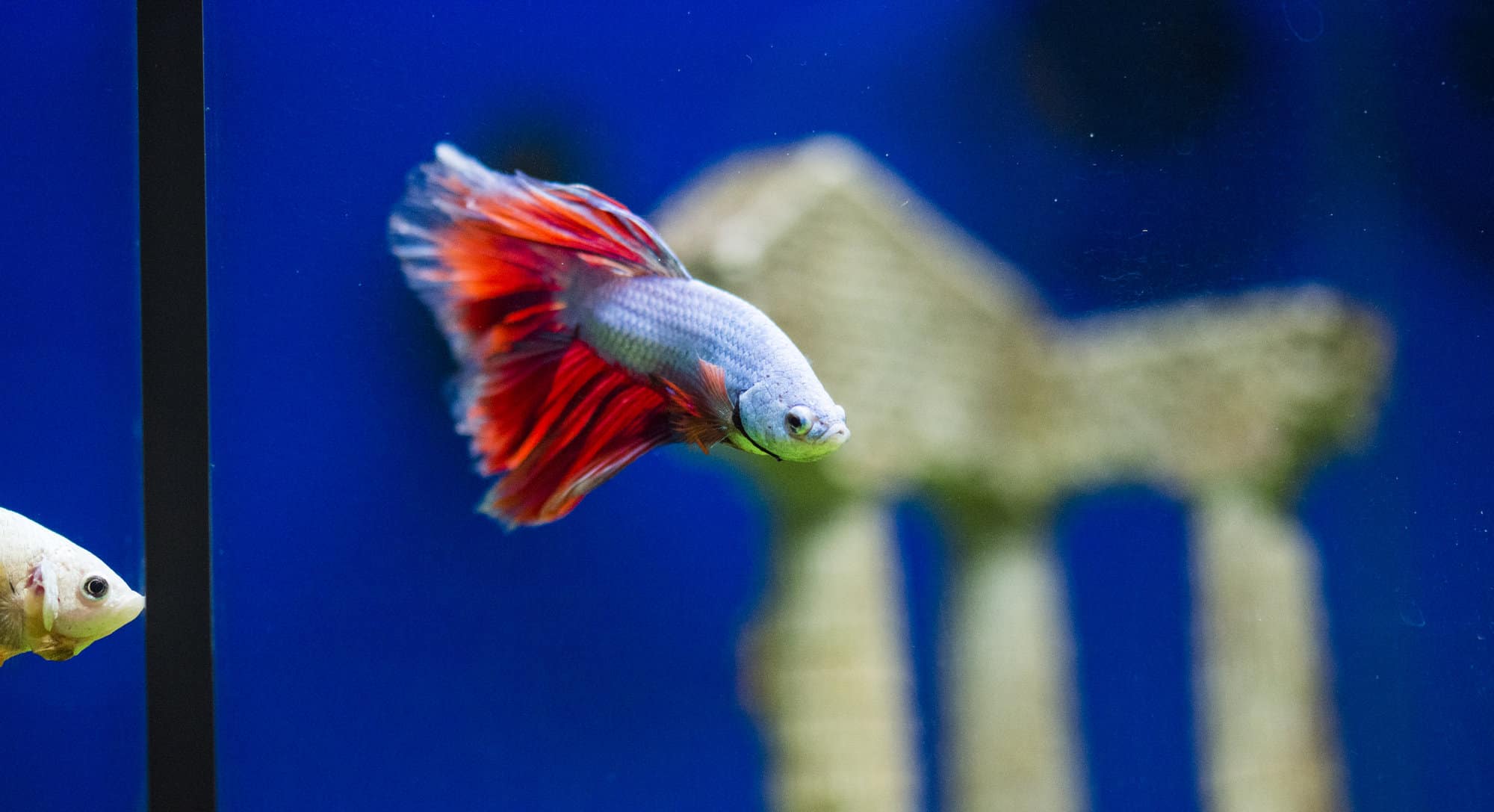You love your betta buddy, and you want him to live his best life in the beautifully aquascaped tank you made for him. But one day, you see your fish eating his favorite treat and then struggling to swallow it!
OMG! Is your precious betta choking?!
But wait, can betta fish choke? And what can you do to help your pet if the worst happens?
Read this guide to learn everything you need to know about betta fish choking and what action you can take to save your pet.
Can Betta Fish Choke?
Yes, all fish, including bettas, can choke.
In betta fish, choking usually happens when the fish eats something that’s too large to fit into the fish’s mouth. The object simply gets stuck in the fish’s mouth, preventing the animal from ingesting it.
This can prevent the fish from using its gills properly, resulting in choking.
Is My Betta Fish Choking?
So, how do you know if your betta fish is choking?
The most obvious signs of a fish choking are “coughing” or retching. If this is a sudden problem in a previously normal fish, then the likely cause is choking rather than some fish disease.
Emergency Treatment
If your betta fish is choking, the chances are he’ll cough up and spit out the object by himself with no intervention from you and make a full recovery.
However, there might be times when your pet can’t get rid of the object that’s causing the problem without your assistance. In that case, you’ll need to help your betta by following these steps:
Before you begin, wash your hands, carefully removing any traces of soap.
Catch Your Betta
First of all, you need to take a closer look at your betta fish to see if you can spot what’s causing the creature to choke.
To do that, you’ll need to use a fish net to gently lift the fish out of the water, keeping his head facing downward if possible. Take a close look at the fish’s mouth.
Bring the net to the water’s surface and place your fingers and thumb gently around the underwater part of the net. Now, apply very light pressure to the betta between his tail and fins.
Examine the Betta
Once in your hand, your betta should relax. When your pet is calm, use scissors to cut a tiny hole in the net close to your fish’s mouth.
Bring the betta’s mouth close to the water’s surface, ensuring that his fins remain beneath the water.
Remove the Object
Finally, use a set of tweezers to open the fish’s mouth and gently remove whatever is trapped inside it.
Never use force to attempt to remove the offending item. That could cause your pet to panic and injure himself, making the situation worse.
If possible, move the object to free up your betta’s jaw and release the obstruction so that you can remove it.
Causes of Choking in Fish
There are several common reasons for choking in most kinds of fish species, including bettas.
Large Food Items
Some bettas are very greedy fish that are seemingly unable to resist grabbing items of food that are too big for them to cope with and swallow easily.
For example, although they do eat some plant matter in the form of algae, bettas are mostly carnivorous. Wild bettas feed on water-bound insects, using their tiny white teeth to latch onto the prey so that it can’t fly away.
However, sometimes, your betta will snatch a piece of food that’s simply too big for him to swallow, and he might gag or choke. That happens because the fish’s esophagus is too narrow for the food to pass down it.
Freeze-dried Food
Some hobbyists inadvertently cause problems by offering freeze-dried food items to their pets that swell once the fish has swallowed them, which can cause other issues, including constipation and bloating.
However, problems occur when the dry food starts to swell in the fish’s throat before he swallows it properly.
Veggies
Another culprit that can cause choking are vegetables, especially peas.
Although bettas prefer meaty foods, they will take peas as a cure for constipation. Sometimes, the betta tries to gulp down the defrosted pea in one go, leading to choking.
How You Can Help Your Betta
Bettas should be fed pieces of food that are smaller than the size of the fish’s mouth.
For example, mini betta pellets are a good choice, as these are specially formulated for tiny betta mouths and shouldn’t cause choking.
When feeding frozen foods, always defrost them first in a little bit of your tank water. That stops the fish from grabbing a chunk of food and trying to swallow it whole.
If any food item looks larger than the fish’s mouth, we recommend that you chop up the meal before offering it to your pet.
Poor Water Conditions
Poor water conditions and high levels of nitrates can cause freshwater fish to choke or gulp as they try to get more oxygen from the water.
Your tank water will be dirty if:
- you don’t clean and maintain your setup and filtration system correctly
- you forget to carry out regular partial water changes
- your tank is overcrowded so that your filter system cannot cope with the demands on it
- you overfeed your fish
The obvious solution to this problem is to ensure that you clean your betta tank regularly.
Take care to use an aquarium vacuum to remove any organic waste, including fish poop and leftover fish food, from around the base of plants, under decorations, and in the fish tank corners.
Test your betta tank water every week for excessive levels of nitrates and carry out partial water changes to correct the levels if necessary.
The Wrong Kind of Water!
You might be surprised to know that using the wrong kind of water can cause gill damage and choking in bettas and other tropical fish species, especially if you use untreated tap water or city water.
Untreated tap water contains chlorine or chloramine that domestic water supply companies add to the water to kill harmful bacteria.
Unfortunately, those chemicals are highly toxic to fish and will also kill the beneficial bacteria colonies that process organic waste products in your betta tank. If your pet fish is kept in untreated tap water, he will choke, suffocate, and die pretty quickly.
The chemicals in untreated tap water can also cause the pH levels in your fish tank to swing rapidly from neutral to acidic with no warning.
Betta fish are pretty sensitive to unstable water chemistry and will undoubtedly suffer if conditions in your tank fluctuate.
How To Keep the Water Safe for Your Betta Fish
The solution to this problem is pretty straightforward. If you decide to use your own tap water to fill your betta’s tank, always treat the water with a water dechlorinator product before adding it to your fish tank.
If you prefer not to use tap water, you might want to consider using RO or Reverse Osmosis water instead.
Distilled water is another option, although that contains none of the essential minerals that betta fish need for optimum health, so you would need to add a supplement to your fish’s food.
Can a Betta Fish Swallow a Rock?
In theory, fish can swallow tiny pieces of stone or gravel.
Types of fish that habitually sift through the substrate looking for food particles often ingest tiny pieces of gravel at the same time. Goldfish are particular culprits for doing that, but bettas have been known to do it too.
Sometimes, if the fish attempts to swallow a piece of rock that’s too large to swallow, the creature will spit out the gravel. However, if the stone gets lodged in the oral cavity, the fish might choke.
Final Thoughts
I hope you enjoyed our guide on whether or not betta fish can choke. If you found the information helpful, please take a moment to share the article.
Bettas usually choke on large pieces of food that won’t fit down the fish’s esophagus. Prevent that by choosing the correct pellet size for your fish and cutting up large pieces of other food before feeding them to your betta.
In addition, make sure that you are using the right type of water and that your water parameters are correct for betta fish.

